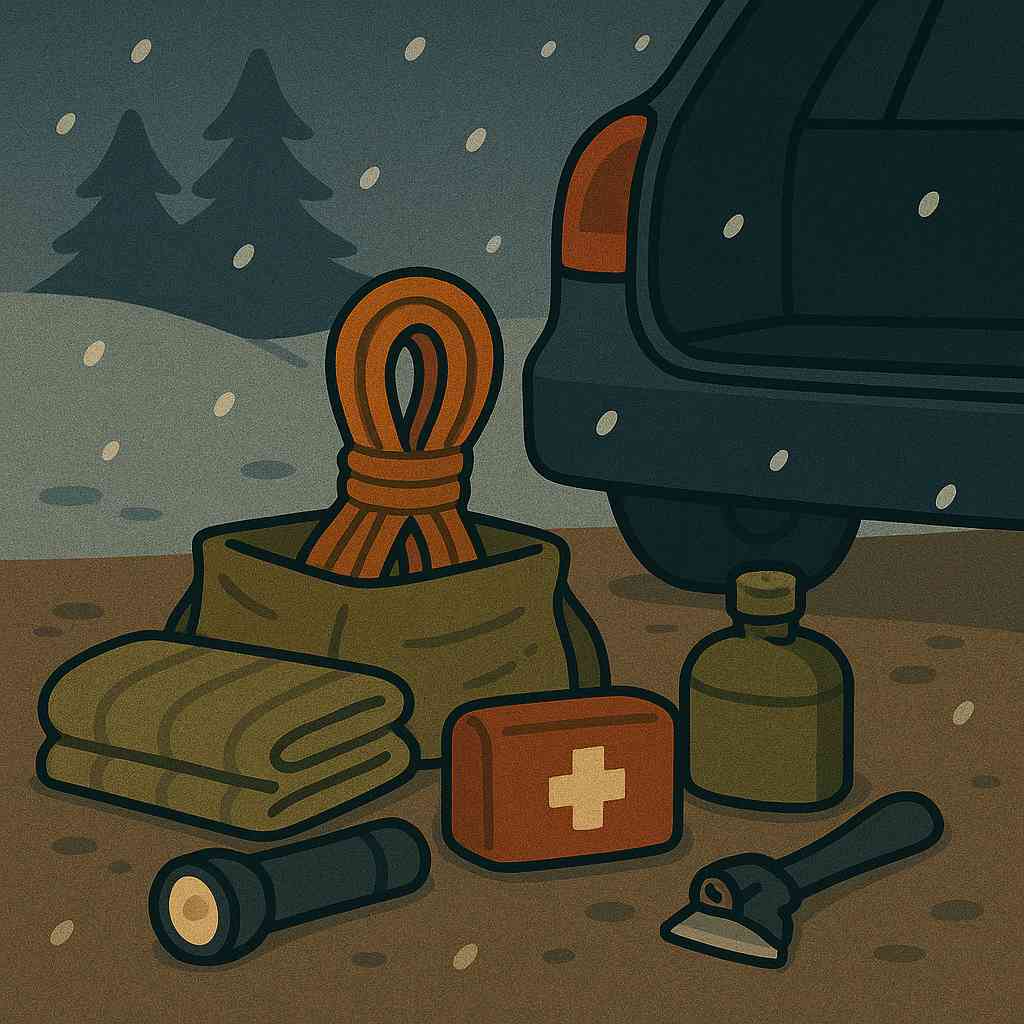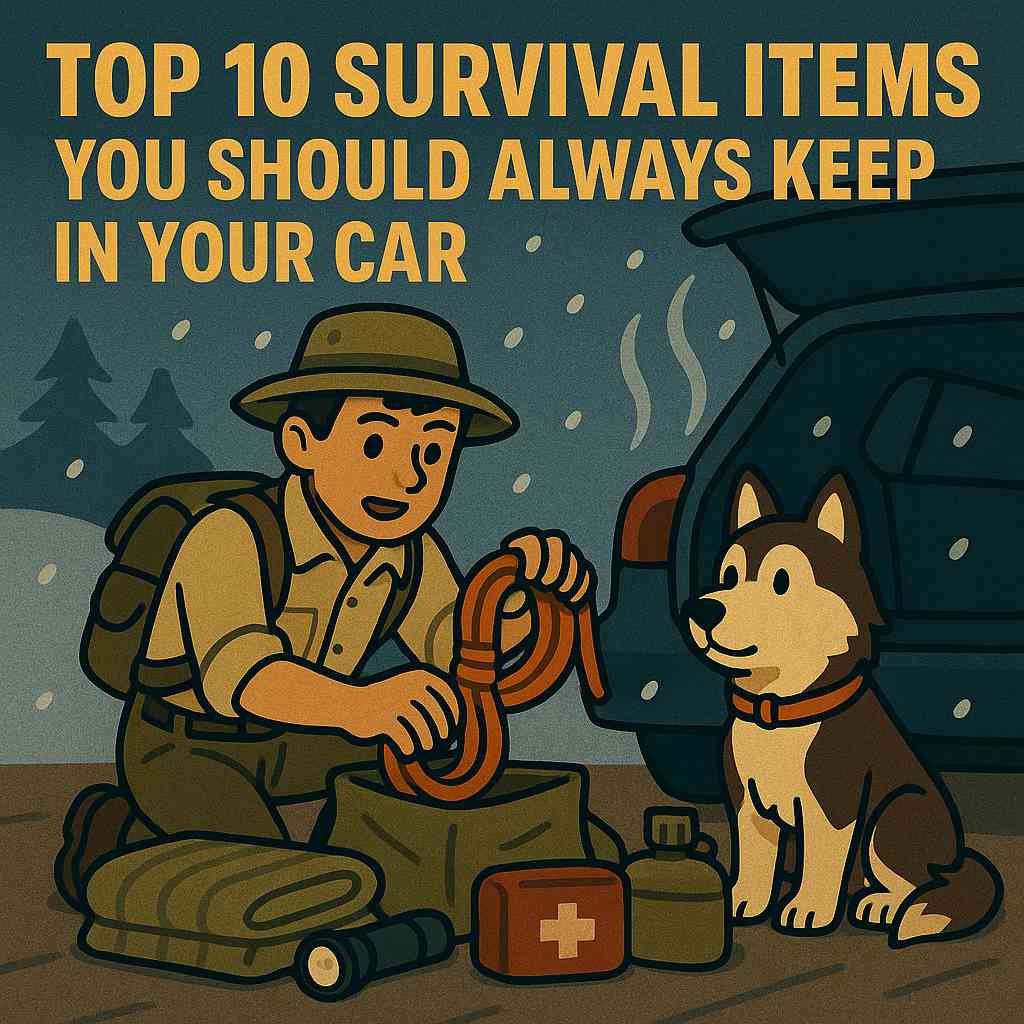You never expect a breakdown, blackout, or blizzard while driving—until it happens. One moment you’re cruising down the highway, and the next you’re stranded with no cell signal, no help, and no heat. In that moment, your car becomes your shelter. Having a car survival kit isn’t just for preppers—it’s a smart move for anyone who drives. Here are 10 items that could make the difference between comfort and catastrophe.
✅ 1. First Aid Kit
Injuries can happen during accidents, evacuations, or even while changing a tire. A compact first aid kit should include bandages, antiseptics, pain relievers, and gloves. Add trauma scissors, a CPR mask, and any personal medications. It’s the single most important item you hope you’ll never need—but always should carry.
✅ 2. Flashlight and Extra Batteries
When your car battery dies at night, a flashlight can be your only source of visibility. Choose an LED flashlight with strong brightness and long runtime. Consider models with a hand crank or solar charging option. Store it somewhere accessible from the driver’s seat.
✅ 3. Thermal Blankets or Sleeping Bag
If you get stuck in snow or stranded overnight, warmth becomes essential. Mylar space blankets are compact and reflect body heat. For extra comfort, add a cold-rated sleeping bag—especially during winter. Hypothermia can begin in just a few hours inside a cold vehicle.
✅ 4. Emergency Food and Water
Non-perishable snacks like protein bars, trail mix, or MREs are great for energy. Store at least one gallon of water, rotating it every 6 months. A compact water filter or purification tablets are great backups in case you’re stuck longer than expected.
✅ 5. Phone Charger and Power Bank
Without power, your phone becomes useless fast. Always keep a fully charged power bank in your kit, ideally solar-powered or with a hand crank. It can be a lifeline to call for help—or access maps and survival apps when offline.
✅ 6. Multi-Tool or Compact Toolkit
A good multi-tool combines screwdrivers, pliers, a knife, and more in one. Add a basic toolkit with jumper cables, duct tape, and a tire pressure gauge. These can get you moving again—or help someone else in need.

✅ 7. Reflective Triangles and Road Flares
If your vehicle breaks down on a dark road, you must be visible. Reflective warning triangles and LED flares prevent accidents and help emergency responders spot you. Store them in your trunk with easy access.
✅ 8. Ice Scraper and Small Shovel
In winter, ice and snow can trap your car. A compact ice scraper helps with visibility, while a small shovel can dig you out. Choose foldable or telescoping models to save space.
✅ 9. Extra Clothing and Gloves
Keep a set of dry clothes, a hat, and gloves in a sealed bag. If you’re soaked in rain or snow, changing quickly prevents heat loss and chills. Insulated gloves also help with vehicle repairs in freezing weather.
✅ 10. Paper Map and Notepad
GPS can fail. Always keep a regional road map in your glovebox. A notepad and pen can help leave messages or track your situation over time. In an emergency, old-school tools still matter.
✅ Conclusion
Every time you get behind the wheel, you take on some risk. But being prepared means you won’t be helpless. With a well-stocked car survival kit, your vehicle becomes more than just transport—it becomes your safe zone. Don’t wait for disaster. Build your kit today and drive with confidence tomorrow.
✅ FAQ
Q1. How often should I check my car survival kit?
A1. Review and refresh it every 6 months. Replace expired food, water, and battery-powered items.
Q2. Can I use my car’s heater during a breakdown?
A2. Only in short bursts. Run the engine periodically to preserve fuel, and crack a window slightly for ventilation.
Q3. What’s the most overlooked item in car survival kits?
A3. A paper map. Most people forget GPS can fail or run out of battery. It’s a simple, low-tech backup that can save you.
Other guides to help you prepare:

